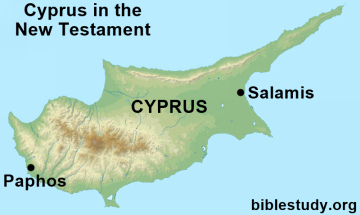Bible Meaning: Boiling, hot
Strong's Concordance #G3974
Paphos was a major city located on the southwestern part of the Island of Cyprus.
The Apostle Paul began his first of five missionary journeys (Acts 13 - 14) in 44 B.C. by taking Barnabas and Mark with him to evangelize Cyprus. Their journey started when they grabbed a boat in Seleucia, on the Syrian coast, and sailed to the island's far eastern city of Salamis. They then travel by foot to Paphos. The Life and Epistles of Paul, by Conybeare and Howson, states the following about their trip.
"From Salamis they traveled to Paphos, at the other extremity of the island. The two towns were probably connected together by a traveled and frequented road. It is indeed likely that, even under the Empire, the islands of the Greek part of the Mediterranean, as Crete and Cyprus, were not so completely provided with lines of internal communication as those which were nearer the metropolis, and had been longer under Roman occupation, such as Corsica and Sardinia . . .
"On the whole, there is little doubt that his journey from Salamis to Paphos, a distance from east to west of not more than a hundred miles, was accomplished in a short time and without difficulty" (Life and Epistles of Paul, chapter 5).

From Saul to Paul
In Paphos, the evangelistic team meets Roman Proconsul Sergius Paulus and his friend the Bible calls Elymas the sorcerer (Bar-jesus). Elymas rejects the gospel message and attempts to thwart Sergius possibly becoming a Christian by opposing Paul's words (Acts 13:6 - 8).
It is at this point in Biblical history that Luke, the author of Acts, adds something fascinating while writing about this confrontation between Paul and Elymas in Paphos.
Paul's birth name is Saul, which Luke uses twenty times from his first reference to him in Acts 7:58 to13:9. He does this even after Saul was "officially" set apart as an apostle in Acts 13:1 - 3. It is however in verse 9 of chapter 13 that, for the first time in the Bible, Saul is called Paul!
Why the change?
Why did Luke start using the name Paul for Saul while describing the apostle's miraculous rebuke of Elymas in Paphos? While Luke doesn't directly tell us why he begins calling Saul the name of Paul, what is clear is Acts 13:9 - 11 records at least two milestones and signals at least two major shifts of the Biblical narrative.
Acts 13:9 - 11 records the first miracle performed by Saul (Paul), a man who, next to Jesus, would become the most influential Christian in history. Second, the miracle was further proof that God called him to carry out a unique ministry. Third, what happened at Paphos signaled a shift from Barnabas being the group's leader to Paul. Lastly, from these verses forward, the Apostle Paul and his ministry becomes the primary focus of Scripture.
Important Verses
Act 13:6 - 11, 13
And when they had gone through the isle unto Paphos, they found a certain sorcerer, a false prophet, a Jew, whose name was Barjesus: Which was with the deputy of the country, Sergius Paulus, a prudent man; who called for Barnabas and Saul, and desired to hear the word of God.
But Elymas the sorcerer (for so is his name by interpretation) withstood them, seeking to turn away the deputy from the faith.
Then Saul, (who also is called Paul,) filled with the Holy Ghost (Spirit), set his eyes on him, and said, O full of all subtilty and all mischief, thou child of the devil, thou enemy of all righteousness, wilt thou not cease to pervert the right ways of the Lord?
And now, behold, the hand of the Lord is upon thee, and thou shalt be blind, not seeing the sun for a season. And immediately there fell on him a mist and a darkness; and he went about seeking some to lead him by the hand . . .
Now when Paul and his company loosed from Paphos, they came to Perga in Pamphylia . . .